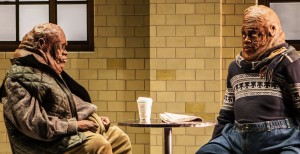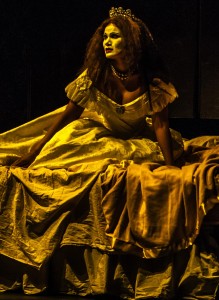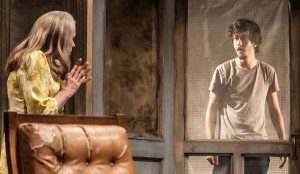Playwright Sarah Ruhl and performance-artist Taylor Mac, both recipients of MacArthur Foundation “genius grants” and past finalists for the Pulitzer Prize for Drama, are currently at the Signature Theatre for a revival of Ruhl’s 1998 adaptation of Orlando, the 1928 novel by Virginia Woolf. Mac, who’s playing the title role, is renowned as a dramatist but, on this occasion, serves strictly as an actor.
Sunset Baby
Sunset Baby begins with Kenyatta (Russell Hornsby), a legend of the Black Liberation Movement who has spent time in prison for robbing an armored truck, speaking hesitantly into a camcorder—the video feed is projected above the stage—about the uncertainties of fatherhood: “Fatherhood. Complex. Complicated. An abstract concept. Not clearly definable.” Just how complicated it is in his particular case is soon revealed when he tries to reunite with his estranged daughter, Nina (Moses Ingram), a woman who has built a hard, protective shell around herself and does not want to hear a whiff of nostalgia from a man she barely knows. She doesn’t even want Kenyatta to say her name: “Do not say my name as if you’ve said it a hundred times. As if we have this familiarity between us. We are not familiar. We are not close.”
Emergence
Things are not as they seem,” intones Patrick Olson, the creator and driving force behind Emergence, an uncanny conceptual performance that merges art, science, music, and monologue and may well be the most original Off-Broadway show this season. Accompanied by an ensemble of four singers, three dancers, and a rock band, Olson invites theatergoers on a transformative journey that tears off the veil from familiar things and explores the deepest aspects of the human experience.
Letters from Max, a ritual
Sarah Ruhl’s Letters from Max, a ritual, is an adaptation of her 2018 epistolary book Letters from Max: A Poet, a Teacher, a Friendship, which included letters between Ruhl and Max Ritvo, her playwriting student and, shortly thereafter, friend. Ritvo died at age 25, of a recurrence of Ewing’s sarcoma, a pediatric cancer first diagnosed when he was 16. He graduated from college while undergoing chemotherapy and surgeries, producing poetry and plays and music along the way, becoming a teacher to Ruhl as much as she was to him.
A Bright New Boise
Samuel D. Hunter creates worlds of complexity and heartbreak in the most banal settings. A Bright New Boise, which premiered in 2010 at The Wild Project and is now making its off-Broadway debut at Signature Theatre as part of Hunter’s Premiere Residency, takes place in the windowless break room of a Hobby Lobby in Boise, Idaho. Under Oliver Butler’s skillful direction, with a strong ensemble and remarkable lead performance by Peter Mark Kendall, Hunter’s characters engage in a desperate search for meaning in ways funny, painful, and devastating.
A Case for the Existence of God
Despite the lofty title, Samuel D. Hunter’s A Case for the Existence of God is a play that at first might seem small, its subject matter as constrained as the little box of an office in which all the action takes place, dwarfed by the expanse of the Irene Diamond stage at Signature Theatre (scenic design by Arnulfo Maldonado). But as this sad and tender piece unfolds, it’s able to touch on universal questions by looking closely at the intersection of two ordinary lives during moments of particular vulnerability.
Curse of the Starving Class
The goose and rabbit who have been delighting audiences on Broadway in The Ferryman now have some competition in the nonhuman actor category: the sheep who graces the stage for much of Signature Theater’s revival of Sam Shepard’s Curse of the Starving Class. It’s clear from the startling outset, when the walls of the dilapidated kitchen crack and break apart, that things aren’t going to end well for human and nonhuman alike. And the play implies that the divide between human and animal isn’t as stark as we would like to imagine
Clueless, the Musical
Unlike, say, a film such as Oliver Stone’s Wall Street, Clueless has the rare good fortune of clearly representing its historical moment without coming off as a creaky relic. Writer/director Amy Heckerling set her 1995 film in a sort of alternate reality, where the fabulously rich teens of Beverly Hills (already its own parallel universe) reference Kenny G and Christian Slater while dropping hyper-intelligent aperçus disguised as Valley Girl slang. Light on its feet and funny as hell, Clueless was in the ’90s but not of the ’90s.
Jerry Springer: The Opera
It’s almost quaint to remember the pearl-clutching inspired by The Jerry Springer Show in its late-1990s heyday. The daytime tabloid presented America as a bottomless basket of deplorables, with any number of people willing to air their dirty laundry in public for a chance to be on TV. Though our current political circus offers more than enough trashy tragicomedy, the still-running Jerry Springer Show once claimed the corner on tacky, made-in-America escapism.
20th Century Blues
Aging is the lens through which Susan Miller’s 20th Century Blues explores the relationships of four women who have known one another for 40 years. The play focuses on the baby-boomer generation and zooms in on how they deal with themselves, their friendships and their social status.
Jesus Hopped the ‘A’ Train
New York Congressman Adriano Espaillat has called it “an 18th-century solution to a 21st-century problem.” New York City Mayor Bill De Blasio has vowed to shutter it in the next decade. Most people don’t think about it unless they’re flying out of LaGuardia, but many don’t have that luxury: Rikers Island, the bête noire of the East River, is one of the largest and worst prisons in America and a hotbed of violence and neglect. Stephen Adly Guirgis’ 2000 play Jesus Hopped the ‘A’ Train, in revival at Signature Center, aims to counteract that neglect and remind its audience of the discarded, forgotten lives behind its iron gates.
In the Blood
When Suzan-Lori Parks decided to write a play based on The Scarlet Letter, she began with the title: Fucking A. Unimpressed, she deleted everything she had and started from scratch, writing the play that would eventually become In the Blood. As Parks tells it, In the Blood had to come out before Fucking A would crystallize; she calls the plays “twins in the womb of my consciousness.” With both in revival at Signature Theatre, audiences have the chance to view Parks’ twins side by side. The plays are riffs on the theme of our duty to one another, colliding with and speaking to each other in a jazzy feedback loop. If In the Blood ends up the less viable of the pair, it still makes for a fascinating examination of the state the nation from a singular American voice.
Fucking A
Suzan-Lori Parks’s plays always speak their own language, but in 2000’s Fucking A the playwright one-upped herself. The women of the play have developed their own semi-secret language called TALK that allows them to hide in plain sight among callous men. It’s as beautiful and elegant an illustration of female solidarity as any in Parks’s work, and indicative of her gift for fashioning skewed worlds that make us see our own world anew. She doesn’t so much pull back the curtain as shoot it through the back wall.
The Antipodes
Annie Baker loves to write sad men. From dropouts KJ and Jasper in The Aliens to lonely movie geeks Sam and Avery in 2014 Pulitzer Prize–winner The Flick, Baker’s plays are populated with lovable losers who can’t quite figure out what they want out of life, and probably wouldn’t be able to get it if they did. The awkward silences that punctuate her comedic quasi-dramas are electric with lost futures, crippling insecurity, and unspoken desires
Death of the Last Black Man in the Whole Entire World...
Signature Theatre, known for year-long retrospectives of the careers of living playwrights, is offering a sensory rich revival of The Death of the Last Black Man in the Whole Entire World AKA The Negro Book of the Dead by Suzan-Lori Parks. This 1990 work from the writer whose Topdog/Underdog won the Pulitzer Prize for Drama in 2002 exists at the crossroads of theater and lyric poetry.
Signature Moves
The Sandbox opens inside a blinding yellow set, and the audience oohs at the sight of a rippling male abdomen, belonging to that of a nameless Young Man standing on a beach, as he stretches his arms up and down. The first impression of this play, the opener in three one-acts under the umbrella title of “Signature Plays,” is that of visual and aural superfluity. In the remaining two plays, Drowning by María Irene Fornés and Funnyhouse of a Negro by Adrienne Kennedy, the visual impressions push and pull between deficit and excess. Albee, Kennedy and Fornés, all resident artists of Signature Theatre’s past seasons, are commemorated in this series of plays; with such heavyweights, it’s no surprise that empathy, satire, and metaphor figure beautifully in a production that fantastically sequenced and pleasingly produced.
In Edward Albee’s tragicomic The Sandbox, bright, gaudy beachwear dances on the bodies of the players, and a cellist plays an affecting, mournful solo throughout. Mommy (Alison Fraser) and Daddy (Frank Wood) are spending an aimless, empty day at the beach, and have dragged a particularly voluble Grandma (Phyllis Somerville) along. Grandma is nearing her end, and she is (ironically) very much taken by the Young Man (Ryan-James Hatanaka) flexing and stretching beside her. Hilarious fourth-wall breaks somewhat diminish the cello’s winding dirge (the music is by Brandon Wolcott), but age and the requisite humor of growing old suffuse Albee’s questions with sadness. The cake-like set (by Mimi Lien) is jarringly reminiscent of filmmaker Wes Anderson’s visual ideas; the striking environment serves as the backdrop for the writer’s melancholic humor. Under Houghton’s masterful direction, the actors are the visual realization of Albee’s kooky, world-weary amusement.
From this melancholic treat for the eyes and ears, we are steered into María Irene Fornés’ Drowning. If there was ever a play that was built to test the dramatic resolve of its audience, it is Drowning. Fornés’ one-act play takes place in what looks like a old-timey diner. The first visual shock we receive are the strange, melted get-ups that the two main characters, Pea (Mikeah Ernest Jennings) and Roe (Sahr Ngaujah), have on. They have science-fiction bodies, although Roe reassures Pea: “You are made of human flesh.” And for our next visual jolt: every movement the actors make is made with agonizing, breathtaking slowness. The push of a newspaper, a lean forward, even the blink of the eye, are retrograded and decelerated. Jennings and Ngaujah move through molasses, as their characters struggle to reconcile their inward innocence and hope with society's reactions to their ugliness.
In perhaps the highlight of the production, Fornés’ slow-moving masterpiece is rendered into a magical, morphing painting. Every visual element is a lullaby of movement. When Pea is rejected by a "fair" woman he has fallen for, Jennings electrifies his performance with anguish, breaking the slow, known rhythm of movement through molasses and yielding to a restive, frenzied unhappiness. His vocalizations of this unhappiness and particularly moving: he says that he is “too smooth and black” for this world, too ugly, undesirable and rough to validate his claim for a fair woman's love. It is difficult to ignore, as is Fornés’ intention, the sharp allegorical reference to the modern plight of the young black man. How does he deal with society's rejection of him, a rejection so inherently based on the color of his skin? Does he ignore the tension bubbling inside of him, as Ngaujah’s Roe does, or does he have no choice but to exorcise it by speaking aloud, as the unfortunate Pea endeavors to?
But if Drowning was a statement on the modern condition of the young black man, Adrienne Kennedy’s Funnyhouse of a Negro is the ultimate homage to the modern mixed life of a half-black, half-white woman. As the final piece in the production, Funnyhouse’s undeterred commitment to shock, upset and amaze its viewers proved an almighty boon to Kennedy's terrific play. From direction (Houghton) to brilliant costume and sound design (Kaye Voyce and Wolcott, respectively), Funnyhouse was the standout piece of the night. It follows the elegantly cosmopolitan mind of the author, studying English literature in New York and living in anonymity, yet struggling with the emotional trauma of her family’s past. On stage, the author (played by Crystal Dickinson) guides us through her varied relationships with Patrice Lumumba, her father and a troubled African priest (a fantastic Sahr Ngaujah), Jesus, and her gold-clad avatars, including the white-faced Duchess of Hapsburg. Booms and swells of jolting, terrifying music punctuate Kennedy’s allegories. Each actor inflects his lines with the playwright’s unique poetic intent—that her emotional life has the makings of a nightmare. It is full of sound, fury and the inescapable divisiveness of growing up as black and a white woman.
Scenic designer Lien again creates a resplendent set, full of moving staircases, disappearing mirrors and golden chandeliers. Red draperies hang from a gilded bed, and pockets of light shine suggestively in corners. The beauty of the final play reminds us strikingly of that bright yellow scene from The Sandbox, and the dancer-like finesse of Drowning. Director James Houghton has seemingly bound the threads of three disparate tales into a single, heady production. Aside from the welcome challenge of building one’s visual literacy as a theatergoer, eyes and ears will take infinite delight in the impressionistic treats of the “Signature Plays.”
“Signature Plays” runs through June 12 in The Alice Griffin Jewel Box Theatre at The Pershing Square Signature Center (480 West 42ndSt.,between 9th and 10th Avenues). For dates and box office information, please visit http://www.signaturetheatre.org//tickets/production.aspx?pid=4284
Horrors in the Heartland
It’s been 20 years since the Broadway revival of Buried Child, and the production by The New Group at the Pershing Square Signature Center suggests that Sam Shepard’s 1978 Pulitzer Prize-winning play has lost some luster. Echoing classic American dramas of dysfunctional families—notably Who’s Afraid of Virginia Woolf? and Long Day’s Journey Into Night—Shepard’s portrait of the American dream gone awry is a post-Vietnam nightmare that combines melodrama and absurdist elements. The latter can try one’s patience, as Shepard hacks away at American mythology with a scythe.
In Derek McLane’s shabby, brownishly-decorated Illinois farmhouse live three people: Dodge (Ed Harris), a sickly, cantankerous, whiskey-swilling patriarch who lounges on a beat-up sofa with a ratty blanket that is every bit as necessary to him as Linus’s in Peanuts. This feeble figure, whose name evokes Dodge City and Western heroism gone to seed, is married to Amy Madigan’s beady-eyed Halie, a woman who is cuckolding him with the local priest, Father Dewis (Larry Pine), who buys her telltale yellow roses. From him, she also wants public support for a statue of their late son Ansel, a basketball “star,” she claims, who died under mysterious circumstances.
A new inhabitant is another son, Tilden, played by Paul Sparks as mentally challenged in the vein of Lennie Small in Of Mice and Men. Tilden has returned home after 27 years in New Mexico; he is generally soft-spoken as well as soft-headed. He finds corn in the backyard when his parents swear nothing grows there, brings it inside and shucks it. Occasionally, he mutters in a shell-shocked way about a secret and something buried in the yard.
Dodge and Halie have a third son, Bradley (Rich Sommer), who uses a wooden leg after a chain-saw accident. Dodge is terrified that Bradley will sneak in and cut his hair while he’s asleep, and indeed, an emasculation in the manner of Samson occurs at the end of Act I. (Shepard’s 1978 version was three acts; in 1996 he reworked the script, and the current production plays without intermission.)
The couple who upset the apple cart, as it were, are Vince, Tilden’s son and the grandson of Dodge and Halie, and his girlfriend, Shelly (Taissa Farmiga); they drop in on his grandparents while traveling cross-country to see Tilden in New Mexico. (Parent-child communications in this family take a beating: Nat Wolff’s Vince hasn't seen his grandparents in six years; and, of course, he has no idea his father has left New Mexico. Moreover, neither father nor grandfather recognizes Vince, let alone remembers him.)
Both McLane’s set and Susan Hilferty’s costumes do a fine job of conveying realism, but much is left unexplained, and one’s suspension of disbelief often strains under Shepard’s symbolism. Why does Vince leave the house to buy liquor and not return till the next morning? Apparently so Shelly can be victimized by the sadistic Bradley and scorned by Dodge and Halie. And when they turn hostile, why doesn’t she explain more quickly that she is their grandson’s girlfriend? Or warn off Bradley before he takes advantage of her? The stage time that it takes for her to use common sense is, as Mark Twain would say, “a stretcher.”
In a climactic moment, when Halie discovers that the backyard has a bounty of vegetables, she yells to Dodge: “Tilden was right about the corn, you know. I’ve never seen such corn… dazzling. Tall as a man already… Carrots, too. Potatoes. Peas.” The idea that a field of high corn would not have been noticed in the backyard defies realism, as does Halie’s mention of potatoes. If she has not seen the corn until now, how can she possibly claim there are potatoes under the earth? But the symbolism of a harvest sprouting from blood and death is the point, not rationality or realism.
Still, in Tilden’s corn-shucking and later, Shelly’s cutting up carrots, director Scott Elliott brings out the humor, although the two younger cast members pale in gravitas and skill compared with the superb veterans. Elliott also creates a terrific sense of febrile menace and poisoned trust. “You think because people propagate they have to love their offspring?” Dodge asks Shelly. “You never seen a bitch eat her puppies?” Life in this American home resembles a dogfight.
Shepard’s cynical view of American ideals and debased notions of national self-esteem were certainly fashionable in the late 1970s. To a large extent they are still hanging around. But Buried Child, for all the vigor of its performances, feels just a bit stale.
The New Group production of Buried Child will play through April 3 at the Alice Griffin Jewel Box Theatre at the Pershing Square Signature Center (480 West 42nd St., between 9th and 10th Avenues) in Manhattan. Evening performances are Tuesday-Friday at 7:30 p.m., and Saturdays at 8 p.m. Matinees are Saturday and Sunday at 2 p.m., and on Wednesdays at 2 p.m. Tickets are $25-$115 and may be arranged visiting www.thenewgroup.org, or through Ticket Central at 212-279-4200, or in person at 416 West 42nd St. (noon to 8 p.m. daily).
Gay Rites Now
Steve, the ambitious new play by Mark Gerrard being presented by The New Group, belongs to a particular subset of gay theater that focuses exclusively on a group of homosexuals. The prototype, Mart Crowley’s The Boys in the Band (1968), reflected the self-loathing of its closeted characters, leavened with bitchy humor. (Its one ostensibly “straight” character may have been bisexual.) Later examples—Kevin Elyot’s My Night with Reg and Terrence McNally’s Love! Valour! Compassion! (both 1994); Peter Gill’s Certain Young Men (1999); and Chuck Ranberg’s End of the World Party (2000)—charted the difficulty of living in the age of AIDS and celebrated the nuclear families that gay people assembled to replace marriage or because of rejection by relatives.
Gerrard’s play may be one of the first in the genre in which matrimony is no longer off the table. Apart from that milestone, however, the interests of its characters are mundane: the exhaustion of parenting, the temptations and repercussions of adultery, and alienation by digital communication. The specter of death is present, but in the form of Ashlie Atkinson’s lesbian buddy Carrie. Dying of cancer, she is one of two best friends to Matt McGrath’s Steven, often called Steve.
Steve’s other best bud is Matt (Mario Cantone), wed to Brian (Jerry Dixon). Steve focuses on the two sets of middle-aged partners navigating the new marital landscape. Steven is 47 and married to Stephen (Malcolm Gets); they have an 8-year-old son, Zack. Matt and Brian are childless. Providing complications are two other characters: Steve, a personal trainer who is never seen, and Esteban, a fetching young Argentinean waiter/dancer (Francisco Pryor Garat) whose path continually crosses Steven’s, until the inevitable occurs. If the conceit of the names is meant to signal that all gay men face fundamentally the same issues, the device comes off as excessively precious.
First among equals is McGrath’s character, and his decency is established by the way he helps the ailing Carrie. Even with the most sallow-faced crankiness, McGrath delivers warmth and a wry wit. Recalling a trip to the beach, he says, “I thought we were all at the beach having a great time… Four middle-aged men, and our occasional lady visitor, desperately interested in the slightest recognition that we’re still sexually desirable to the sexually desirable—or even to the almost-sexually desirable—secretly afraid that we’re not, but bravely clinging to the illusion—and each other—like a jaunty, gay Raft of the Medusa.”
But Steven has learned that Stephen is having an affair with Brian. Under Cynthia Nixon’s direction, we see it conducted through ribald sexting, shown on an upstage wall by Olivia Sebesky’s projections. Steven shields Matt from the truth, even after he learns that Brian has invited trainer Steve to move in, and with Matt, become a threesome. Moreover, that arrangement has been made possible by Steven’s taking in Carrie, grown sicker with her cancer and needing a place to stay. Feeling unappreciated and betrayed by Stephen, Steven pursues Esteban. It’s all fundamentally The Seven Year Itch, but multiplied and with twists.
One problem is that one never sees the relationship Stephen and Steven have before Steven’s discovery of incriminating evidence (which he keeps to himself), so the stakes are unclear. And Gets and McGrath have scant chemistry; they’re at odds from the first, and the former has a thankless part, frequently tapping on a cellphone in his hand as the audience reads the projections.
Nixon tries to lighten the tone using Broadway show music during scene changes (and in a prelude of roughly 20 minutes, when the cast stands around an upright and sings). And Gerrard ladles on musical-theater in-jokes relentlessly. Steve laments, “What kind of God would allow the movie version of Mame?” Matt talks about his upcoming three-way: “We’re excited. Excited and scared”—one of many direct references to Stephen Sondheim. Indeed, Steve’s drink of choice is a vodka stinger.
The unsettled tone may reflect the honest bewilderment of where gay life goes from here, but it looks only marginally different from what any relationship faces, except for the issue of sex. In a piquant but fleeting moment, Gerrard suggests that fidelity is an overrated construct. As Brian boasts to the group in the climactic scene: “I came this close to making out with the most beautiful boy in the kitchen who turned out to be the most beautiful girl. And maybe we made out a little anyway.”
The New Group presents Steve at the Pershing Square Signature Center (480 West 42nd St. between 9th and 10th Aves.) in Manhattan through Dec. 27. Evening performances are at 7:30 p.m. on Tuesday-Friday and 8 p.m. on Saturday; matinees are at 2 p.m. on Saturday and Sunday, with special matinees on Dec. 16 and 23. For tickets, visit www.thenewgroup.org.



























